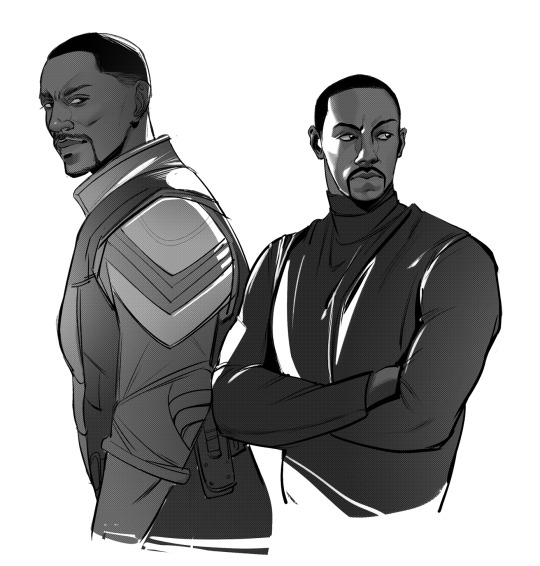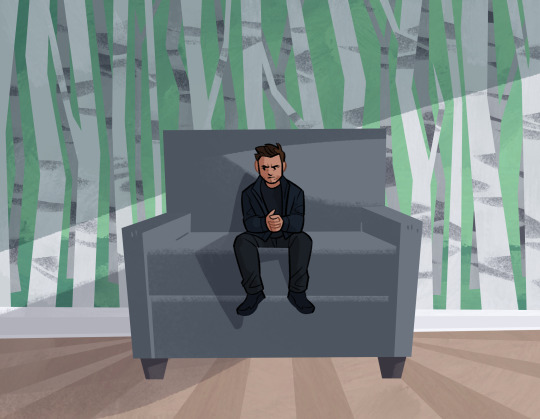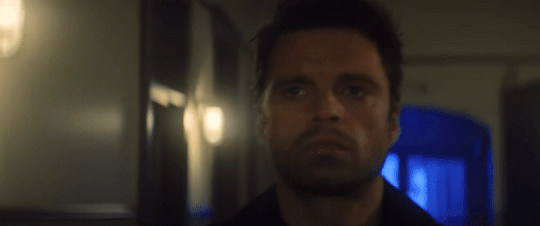Text

a little peace down in delacroix
(click for better quality!)
3K notes
·
View notes
Photo

if you told me a week ago that I’d be drawing sambucky cuddling in a field of daisies…
6K notes
·
View notes
Photo


7K notes
·
View notes
Photo

logically i know that Bucky is sitting on a couch in his therapist’s office… it just looks like a really big chair to me

13K notes
·
View notes
Text
Freight Car

Chapter One of the Brown Book Series
Rating: Mature
Warnings: Mentions of violence, PTSD (!), swearing
Word Count: 3.4k
Series Summary: Nine years ago, The Winter Soldier murdered your friend in front of you. Nine years later, Bucky Barnes shows up at your door with the hope of making amends.
⭑⭑⭑
⭑⭑
⭑
You wake up on the floor again.
In the crossfade between dreaming to waking, the hardwood is concrete against your cheek. The sweat in your hair is the slick of blood. You fade in and out, and awareness comes back slowly. A siren descends, moving closer and closer, then recedes into the quiet. You don’t know if you imagined it.
You do know that your alarm isn’t blaring. Your ringtone isn’t sounding. The birds chattering and chirping at your window are real. The steady knocking of your heart against your ribs is real. Maybe that’s enough.
You open your eyes. A sliver of light from the parted curtains cuts across the floor. Above it, dust dances in the still air. All is calm. If you had woken up in your bed, this would be a good morning.
But you didn’t wake up in your bed. So, you peel yourself off the floor and half-walk, half-limp to the bathroom. As you cross the threshold and flick on the light, a face flashes before you. Before your mind can work to discern its features, you slam the door shut and flip the switch. You cry in the dark.
⭑⭑⭑
You call into work again.
You’re tempted to stay where you are—curled in on yourself under the covers—but Dr. Kaplan’s gentle voice prods from inside your skull. “Trauma changes over time,” it says. “You have to face it as it comes. You’ll feel worse if you put off dealing with it.”
She picks up on the second ring. Judging by the sound of clinking silverware, she’s on her lunch break. You promise to keep this impromptu session short.
“I haven’t had a nightmare like that in a long time. That’s why it hit me so hard, I think.” You begin. Your eyes fill with tears. You don’t know why. The nightmare is so distant now — just bits of feeling. Your brain is scrubbing away the memory like a mounted defense.
You’re quiet for what feels like minutes, and Dr. Kaplan just waits. She doesn’t pose a question or make a suggestion: in other words, she doesn’t offer an out. She never does. At first, her silence and seemingly unending patience unnerved you. You would later understand the value of having the space to organize your thoughts before speaking them.
“I thought I was doing better,” you eventually say. “But now, it’s like I’m back where I started.”
“You are not back where you started,” she says. “We haven’t talked about your night terrors in months when we used to talk about them every session. That’s incredible progress. You should be proud of how far you’ve come.”
You hold the phone away so she can’t hear the tears in your voice. “But what does it mean? ”
“Well,” she pauses. “Have you been thinking about Jean lately?”
“Kind of,” you start to say, then remember Dr. Kaplan’s rule about specifics. “I’ve probably thought about her… twice in the past week. Marie, she, uh, she sent me a Facebook request.”
“Did you accept it?” She asks, with just a hint of amusement.
“I haven’t. I don’t know if I should.”
“Why not?” Dr. Kaplan asks. She knows the answer, of course. You haven’t spoken to Marie since the funeral nearly a decade ago. You know she resents you. You saw it in the tightness of her smiles and the way her eyes turned to stone as you stood before Jean’s casket. You’re alive and her sister isn’t. You understand that. What you don’t understand is why she would reach out to you after so many years.
“I’m afraid of what she’ll say,” you admit.
“It wasn’t your fault.” Dr. Kaplan says. You shift on the couch. “She knows that. Maybe she’s been thinking about Jean, too.”
“Yeah,” you respond simply. Your head is light from dehydration, and you should probably take a nap at some point.
“I’d recommend you take easy today…”
“But?”
“But next week, I’d like to hear about your Facebook convo.”
You smile. The tears have dried on your face.
⭑⭑⭑
Snippets of dialogue filter through your thoughts. A woman is talking about a missing child, and a detective is asking the “who, what, where”s. It’s an episode you’ve already seen, but it makes for good background noise: the dramatic stings, the fast-talking, the screech of tires as the driver peels off. You don’t know why you gravitate towards crime shows. It might be a bit morbid, but until now, you’ve never thought to mention it to Dr. Kaplan.
You’re almost done with the cake batter. It’s looking a little watery, though. You really should have followed the recipe instead of improvising.
You reach for the flour bag on the counter, and just as you raise it to the mixing bowl, someone knocks at your door. You jolt and the bag slips from your hands. You narrowly dodge as it plummets to the ground. It lands with a thump and now, your feet and pants and floor are covered in a film of white powder.
“Fuck,” you breathe.
There’s another knock, a bit louder this time.
“Give me — give me just a minute!” You call out, voice frayed.
You step over your mess and towards the door. You notice how slick your hand is on the doorknob, so you wipe your hands on your pants and try again. You forget your ritual of checking and re-checking the peephole. You unlock the door, already anxious at the idea of keeping anyone waiting.
When you finally swing the door open, a tall, dark-haired white guy is staring at the carpeted hallway floor. He’s not looking at you, but you feel exposed in your flimsy tank top and flour-splattered pajama pants.
Meanwhile, his look is carefully nondescript: a leather jacket, a dark shirt, and jeans. His hands are stuffed into his pockets and his shoulders are slightly hunched. He looks like someone who doesn’t want to be seen, but here he is, standing at your door.
Maybe he’s just a neighbor on a reluctant mission to convince you to turn your volume down. Maybe he’s a dealer at the wrong address. Maybe he —
Your stomach drops. The shadows had been obscuring his face, but now that he’s tilting his chin up to look at you… the broadness of his forehead, the color of his hair, his height, all these things pull together. They pull tighter and tighter around your heart, and you realize that you’ve seen this man before. You’ve seen him a thousand times.
Your hand flies up to your neck. Fear hits like a punch to your gut. He looks normal — so normal that you could convince yourself that it’s not him. It’s not him.
But now, his eyes — a startling shade of blue— meet yours. Cold washes over you as every sensation in your body amplifies. You feel small and weak. Your vision starts trembling at the edges. You can’t move — not even to release your breath.
“I’m not here to hurt you,” he says. His voice sounds so different from the one in your memories. It’s not as coarse and low, it’s gentler and higher-pitched. “I just wanna talk.”
“Talk.” The word escapes you, but you hadn’t meant to speak. Hearing your own voice makes this real.
He clears his throat. “My name is James Barnes, and I’m no longer The Winter Soldier.”
The Winter Soldier. You suppose it doesn’t matter now what that means. If these are your last moments, you’re not going to spend them deciphering code. Instead, you think of your life and all the things you’ve done and all that you haven’t done. In the span of moments, you try to make peace with your death.
“If you’re going to kill me...” you can’t keep your voice from shaking, “do it.”
His eyes widen. “I’m not here to kill you. I’m — ”
“Hydra wants to know what I know. Is that it?” Your mind reels with the new theory.
His eyebrows tick up. “Hydra doesn’t exist anymore,” he says with a measured tone. “Not really.”
You don’t know how to respond to that divulgence. You don’t even know if you can trust it.
“I’m here because you,” he adds your name — your real name, “are part of my efforts to make amends.”
Your thoughts catch on how he knows your name. It’s a small thing, really. He knows where you live, after all.
“I know you’re confused, and I know you have questions.” He reaches up to scratch his neck. “And if you’re not, ah...” he glances from your face to your body, as if he were just now noticing your state of dress, “comfortable talking here, we can talk somewhere public. I guess what I’m asking is: can I buy you lunch or, uh, dinner? ”
You consider, seriously, that this man may be clinically insane. You have no other rational explanation for his showing up at your door on a Thursday afternoon, let alone his proposition. But you allow yourself to imagine it: you and him, sitting across a table with Jean’s ghost between and behind you. Your stomach turns at the thought.
“You murdered my friend,” you say slowly, “right in front of me.”
He nods. A pained look crosses his face, and that expression spurs your anger. It hadn’t occurred to you earlier that you should call the police. This man is a murderer, and he’s walking free.
“You shouldn’t even be here — you should be in a prison somewhere!” You choke out as your throat tightens with impending tears.
“I didn’t have a choice. I didn’t want to kill her!” He says forcefully. “I didn’t want to kill anyone. I — ”
“But you did kill her!” You can’t hold them back anymore, and now, you’re crying in front of the man who killed Jean. Humiliation heats your cheeks.
“You did kill her,” you repeat quietly. You turn your watery gaze away.
“You’re right, I’m sorry.” He says.
In your peripheral, you watch him step closer. When you flinch, he bobs back.
You should step back, shut the door, and call the police. Not that a slab of wood could stop him if he wanted to get to you. You’ve seen his silver arm. You’ve felt the grip of its fingers at the base of your neck. But, maybe you could manage a dial ‘9-1-1’ before —
“Look, I’m not asking for your forgiveness,” he interrupts your line of thought and, against your will, you look at him again, “I know I don’t deserve it, but I do want to offer you answers. Maybe it can…” He waves his hand as he searches for what he thinks are the right words. “Maybe it can give you some closure. And then, you’ll never see me again.”
You consider the furrow of his eyebrows. Over the years, you’ve tried reconstructing his face from its missing half. Now that you have the full picture, it makes perfect sense: the upper edges of the mask aligned with the cut of his cheekbones, the thin bridge really did conform to his nose, and the wideness of his jaw was merely accentuated. But his features are such a striking contrast to the severity of that mask and that metal arm. He looks so much leaner than you remember. He looks like a man, not a machine.
“Stay here,” you say. “I’ll be out in a minute.”
He nods and his brow softens. You shut the door and press your forehead against it.
After a few beats, you rest your hand on the base of your neck and suck in a few deep breaths. It’s a calming technique Dr. Kaplan taught you. But without meaning to, you flex your fingers. Just as your heart was beginning to slow, you’re pulled into the memory of him raising you by the throat. You gasp for air.
That man is behind this door. That man is behind this door.
You race around the couch to snatch your phone off the coffee table. You unlock it with shaking hands and now, your thumb hovers over the number pad.
“Fuck,” you whisper as you press ‘9’.
It’s true. You do want answers. You want to know why he killed her. You want to know about Hydra and his role in it. You want to know why he left you alive.
So you’ll get your answers, then call the cops.
You pull on some real pants and cover up with a sweatshirt. But at the door, you hesitate to step out again. If you’ve imagined that whole encounter, if it was some vivid manifestation of your survivor’s guilt, then you wouldn’t have to go.
You press your ear against the door, and, as if your doubts had broadcasted through the wood, he coughs. You sigh and grab the doorknob. Your hand isn’t sweaty this time.
At the sound of the hinges creaking, his gaze snaps to you. You meet his eyes without meaning to. There’s no recognizable emotion in them. The creases in his forehead and the furrow in his brow are gone. Now, his face gives nothing away.
“There’s a place about two blocks from here,” you say simply.
He nods and looks to you as if for direction. If he were anyone else, you would start heading for the elevator without further ado, but the thought of Jean’s killer trailing behind you makes your stomach flip.
“I’d prefer you walk ahead,” you utter. His eyebrows raise slightly, but he gives no other visible reaction.
“Alright,” he says.
He moves down the hallway, and you follow. Your eyes stay trained on his back. Aside from your occasional direction, it’s a silent walk.
⭑⭑⭑
Sully’s is a dive, but it’s always busy, and this evening is no exception. The people who frequent this place are the kind of people who get loud after a few drinks and don’t give two shits about you unless you’re bleeding out on the floor. That’s perfect. God forbid anyone overhears your questions about murder and secret organizations.
“You want anything?” He asks after you choose a corner booth and tuck in. His casual tone bothers you, but he keeps his distance, at the very least.
“No,” you deadpan.
He nods and starts for the bar. A few people graze him as he passes, and it’s so crowded that you’ve already lost sight of him.
You place your phone face-up on the sticky, varnished wood table. Absentmindedly, you nudge the pedal base with your foot. You try to hone in on any particular voice, but all you hear is a buzz of conversation. It’s a comfort. It means that you’re not alone and he can’t hurt you here.
“I know you didn’t ask for anything, but…” Fuck. Your knee knocks on the bottom of the table. His voice is so sudden at your side.
He places a water glass in front of you, and you stop yourself before you can say “thanks”. He drops into the chair in front of you, a beer bottle tucked between his gloved palms. Gloves. He’s wearing gloves. You hadn’t noticed until now.
There’s an awkward pause. He watches you intently. Your stomach is churning, but you steadily meet his gaze. You have so many questions. Some of the things he’s said don’t make sense. One thing, in particular, though, is nagging at you.
“Back there, you said you didn’t have a choice,” you say dubiously, “what did you mean?”
He takes a drag of beer and sets the bottle down carefully before he speaks. “They brainwashed me.” He replies bluntly. “Hydra, I mean.”
Brainwashing? It’s not entirely outside the realm of possibility. Aliens exist, as do superheroes and Norse gods and Mad Titans. What was once science-fiction is now very real and devastating.
He gives you a few beats to process, then continues. “For seventy years, I operated as The Winter Soldier.”
“Wait. Seventy years?”
“I just turned 106 in March,” he says with a sardonic smile.
“How is that possible?”
“I was on ice.” He sighs. “They only took me out when they needed me.”
“And Hydra… what happened to them?”
His jaw tightens. It’s the most reaction you’ve gotten so far. “They used to have this saying: cut off one head, two more take its place… Maybe they’ll come back, but right now, they’re gone.”
“So they aren’t after me,” you say softly, more to yourself than him.
“If Hydra wanted you out of the way, they wouldn’t’ve sent me.” He grimaces, even as his voice mocks a shrug.
You get it now: you’re not a threat, and you never were.
“But I was a loose end, wasn’t I? Why didn’t you kill me?”
He shakes his head and says, “I don’t know.”
He doesn’t elaborate further. Instead, he finishes off his bottle and shifts his gaze to the table.
After a minute or two, you consider moving on, but something about his expression, both vacant and pensive, implores you to wait. In the interim, you glance from the people knocking shoulders at the bar to the couple in front of you.
“It was that look on your face,” he says, and you find his gaze is fixed on you again. “It was rage. And grief. And that-that grief almost overtook everything else, but I saw it.” He leans towards you, his eyebrows knitting close. “That part of you that… that part of you that wanted me to kill you, too.”
He glances at his hand on the table and releases a shaky breath. “I understood that,” he says. “I know what it’s like.”
Like a clenched fist releasing, the tightness in your chest eases. You understand something else, now, too. This is meant to be an exchange. He wants answers as much as you do, no matter how much pain they carry.
“Do you wanna know what I saw? On your face?” You ask after a few beats. He hesitantly nods. “Nothing. There was nothing,” you say. “You didn’t even look human. It was like you were an animal. And you were looking at me like I was prey.”
You look away. The intensity of his eyes threatens to pull you into that memory. “I’ve never been more terrified in my entire life.”
“I’m so sorry,” you hear him say.
“I’m not the one you should be apologizing to,” you say quietly, chancing a glance up.
His face twists into something like shame. If he were a different person, you might try to comfort him. But he’s not a different person. He’s a stranger wearing the face that’s haunted you for nine years.
“So why now?”
“Well, I was…” He mimics a snap with his right hand. “And after that, I… started going to therapy.”
He pulls a small, brown book from his jacket pocket. “My, uh, shrink told me to make a list of people I’ve wronged,” he says as he flips it open to a page in the middle and places it in front of you. “You’re one of the last.”
You find your name third-to-bottom. The ones above are crossed through. He glances from your face to your fingers as they trace his careful scrawl.
“You don’t let people look at this, do you?” You ask.
He half-smiles and shakes his head.
“So why are you letting me?”
“I, uh,” he flexes his hand. “I don’t know. I just… thought I owed it to you.”
You briefly consider asking about the other names, but he doesn’t owe you those. He owes you answers about the life he can’t return. Just as another question bubbles up your throat, a ringtone sounds. You glance at your phone’s black screen, then back to his furrowed brow. He reaches into his back pocket to fish out a flip phone. A flip phone. You haven’t seen one in years.
“Shit,” he mutters under his breath. He looks up from the screen.
“Sorry, I have to take this,” he says as he squeezes out of the booth. He disappears as quickly as before.
⭑⭑⭑
You finally take a sip of water. The sweat of the glass bleeds onto your fingertips, so you wipe your hand off on your pant leg before touching your phone. 6:15, it says, which means you've been sitting on this hard, plastic seat for over forty minutes. He's been gone for about ten of them.
Before you can seriously consider just leaving, his form comes into view.
"I've gotta go, but..." He says as he pulls the brown book out of his pocket again. When he opens it, he tears a small piece from the page corner, then scribbles something with a pen.
He places the piece of paper next to the perspiration ring on the table. Stealing one last glance at you, he turns and leaves for the third and final time.
On it is a phone number and a name:
Bucky
#tfatws spoilers#bucky barnes x reader#bucky barnes#the falcon and the winter soldier#the birdman and the winter warrior#brown book
108 notes
·
View notes